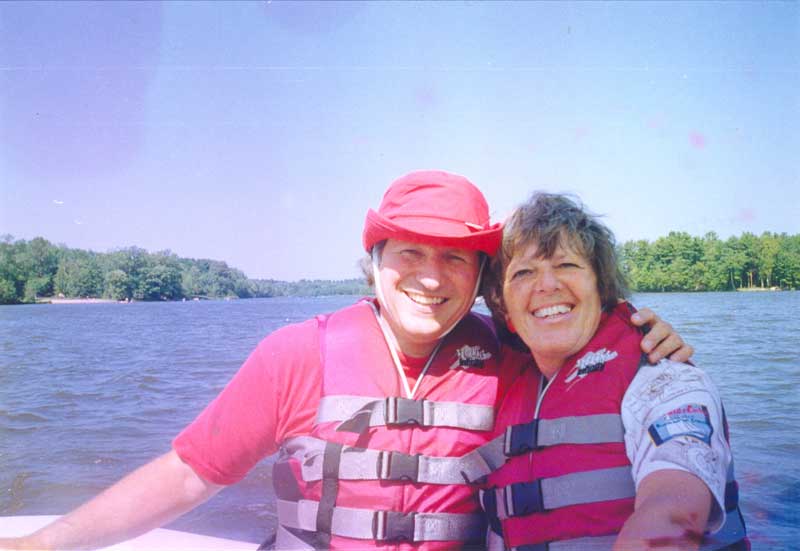|
“How much time?”
“Two minutes fifteen.”
“Time the line start-i-n-g . . . now!”
“Thirty-five seconds.”
“Ready, about. Time.”
“Minute thirty.”
“Tell me when it’s forty-five.”
“Forty-five.”
“Ready about. Let that jib out - we’re early. OK,
now pull it in.”
“Head up, head up, starboard, right-of-way!” Terry
yells at the boats to port.
The gun goes off, we scramble up on the high side,
Terry heads up just inches from the boat to
starboard and another race is underway.
 |
| Terry and Shirley Schroeder
back in 1995. |
Terry’s the skipper – I’m the crew and my main job
before any race is to watch the clock. I bury my
head in my chest and stare at the stopwatch so I
don’t have to see how close we are to other boats
or the committee boat at the start of a race.
Adrenalin runs rampant, mouth is dry, all muscles
tense until we clear that starting line and the
race is underway.
For nearly thirty-five years, my husband Terry and
I raced our 19’ Flying Scot sailboat, Checkmate.
That first summer the boat was on the lake nearly
every day and when we won the very first race
entered, we were bitten by the racing bug. Once
bitten, the only cure was to enter every race
possible. So we did and we raced every summer
until this one. We have dozens of trophies to show
for our sport. While the trophies meant a lot at
first, after while they were expected. We won
everything from individual regattas, highest
points for the season, Skipper of the Year, Crew
of the Year and good sportsmanship. Terry has a
trophy named after him at the annual North
American Flying Scot Championship Regatta.
How I loved being in that Flying Scot. For those
who aren’t familiar with it, it’s 19 feet long,
seven feet wide, has a centerboard that reaches
approx. 6 feet down and boasts three sails, main,
jib and spinnaker. Because of its width, it’s a
very stable boat. It has seats much like a normal
chair and room enough for eight adults. It’s
entirely fiberglass with styrofoam floatation and
unsinkable. One of my favorite things about it was
to lean over the side and dip my hand into the
water.
While most of our Flying Scot friends sailed their
Scot for a few years and upgraded to a cruising
boat, we couldn’t bring ourselves to leave our
Scot. It was just too much fun being down near
that water.
But last summer was the end of my racing career.
It’s most difficult to explain the emotions that
ran rampant through my mind and soul when it
became clear to me I couldn’t handle what it took
to race anymore. Oh, I tried it. Went out there as
usual only to find my seventy-year-old legs just
couldn’t handle scrambling over the centerboard
and up the high side to hike out. That entire
night I tossed and turned, aching, stabbing pain
in every leg muscle and joint. I had to keep
moving my legs because I couldn’t stand the agony
when I lay still. After that sleepless night I
realized my racing career was over. Not sailing.
Just racing. At least racing in our Flying Scot.
Emotions I dealt with were an overwhelming sense
of loss – loss not only for me but Terry. He
depended on me in a race because over the years he
trained me to do exactly what he wanted when.
Husband-wife teams are rare because most skippers
become Captain Bly when racing. And he went
through that stage but soon learned I was the best
crew if only because I was more available than
anyone else. We had our share of arguments on the
water but we both loved it out there too much so
soon learned to make allowances for each other.
Besides a sense of loss times two – one for me,
one for Terry – I felt like I was letting him
down. On the other hand, I am just plain
physically unable to go on. I had to face it – the
end had come for me to crew in races with our
Flying Scot.
People might wonder why I can’t just sit in the
boat? Why move about so much? Instinct won’t let
me just sit there – not during a race. In a race
my entire body is trained to move constantly
depending on how the boat heels. Without thinking
I automatically switch my weight back and forth,
move at exactly the right moment when tacking so
weight distribution is perfect and there is no
time to relax until the race is over.
So now what? We give up sailing? Not yet! We’re
going to get a cruising boat. Not too big so we
can trailer it around the area but big enough to
it’ll be less taxing on my old legs. Sad as it is
to say farewell to Checkmate, it’s easier that
than farewell to sailing.
Shirley Schroeder is a freelance writer from
Wisconsin and a member of the Lake DuBay Sailing
Association.
TOP/images/top.jpg)
|

